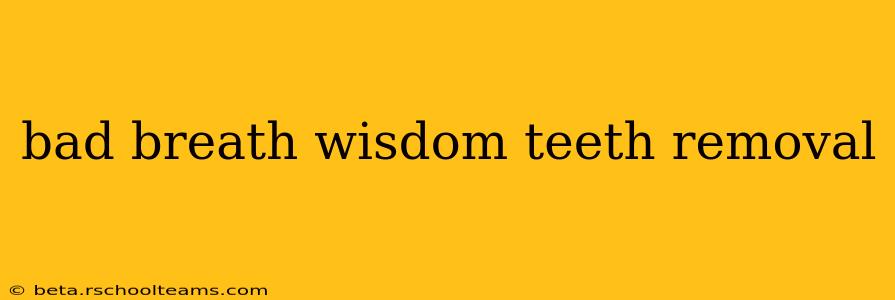Wisdom teeth removal is a common procedure, but it often leaves patients with a lingering concern: bad breath. This isn't just an unpleasant side effect; it can be a sign of underlying issues that need attention. Understanding the causes, prevention strategies, and treatment options is crucial for a smooth post-operative recovery and fresh breath.
Why Do I Have Bad Breath After Wisdom Teeth Removal?
The primary reason for bad breath after wisdom teeth extraction is the presence of blood clots, food particles, and bacteria in the extraction sockets. These create a breeding ground for anaerobic bacteria, which produce volatile sulfur compounds (VSCs) – the primary culprits behind halitosis (bad breath). The healing process itself also contributes, as the body works to repair the damaged tissue, leading to temporary inflammation and potential odor.
What are the Specific Causes of Post-Operative Bad Breath?
- Blood Clots: Initial blood clots are essential for healing, but if dislodged, they can decompose, leading to foul odor.
- Food Debris: Trapped food particles in the extraction sites readily decompose, contributing to bad breath.
- Infection: In some cases, infection can develop in the extraction sockets, causing a more severe and persistent bad breath. This is often accompanied by pain, swelling, and pus.
- Dry Socket (Alveolar Osteitis): This painful complication occurs when the blood clot is lost prematurely, exposing the bone and nerve endings. It significantly increases the risk of bad breath and infection.
- Poor Oral Hygiene: Neglecting oral hygiene after surgery exacerbates the problem, allowing bacteria to thrive.
How Can I Prevent Bad Breath After Wisdom Teeth Removal?
Prevention is key to avoiding post-operative bad breath. Follow your oral surgeon's instructions diligently, and incorporate these helpful tips:
- Maintain meticulous oral hygiene: Gently rinse your mouth with prescribed antiseptic mouthwash several times a day. Avoid vigorous rinsing or spitting, which could dislodge the blood clot. Brush gently around the extraction sites once the initial healing begins (typically after 24-48 hours), avoiding direct contact with the sites.
- Eat a soft, bland diet: Avoid foods that could get lodged in the extraction sockets, such as hard, crunchy, or sticky foods.
- Stay hydrated: Drinking plenty of water helps flush out bacteria and debris.
- Avoid smoking and alcohol: These substances hinder the healing process and can worsen bad breath.
- Follow your surgeon's post-operative instructions: This is crucial for preventing complications and ensuring proper healing.
How Long Does Bad Breath Last After Wisdom Teeth Removal?
The duration of bad breath varies depending on individual healing rates and adherence to post-operative instructions. Generally, it should subside within a week to ten days as the extraction sites heal. However, if bad breath persists for longer, it indicates a possible complication, requiring immediate attention from your oral surgeon or dentist.
What Should I Do if I Still Have Bad Breath After a Week?
Persistent bad breath after a week could signal an infection or dry socket. Contact your oral surgeon immediately if you experience:
- Persistent foul odor
- Increased pain or swelling
- Pus or discharge from the extraction sites
- Fever
Your oral surgeon will assess the situation and provide appropriate treatment, which might involve antibiotics, irrigation of the sockets, or other necessary interventions.
Does Bad Breath After Wisdom Teeth Removal Mean I Have an Infection?
While bad breath itself doesn't automatically mean infection, it is a potential warning sign. If accompanied by other symptoms like pain, swelling, fever, or pus, it strongly suggests an infection. It's vital to seek professional dental care to rule out any complications.
Is There a Way to Speed Up the Healing Process to Reduce Bad Breath?
While you cannot dramatically speed up the natural healing process, following the post-operative instructions meticulously and maintaining impeccable oral hygiene significantly reduces the duration of bad breath and promotes faster healing. Staying hydrated and eating a nutritious diet also supports the body's repair mechanisms. Avoid smoking and excessive alcohol consumption.
By following these recommendations, you can minimize the risk of bad breath and ensure a smoother recovery after wisdom teeth removal. Remember, maintaining good communication with your oral surgeon is vital for addressing any concerns and ensuring optimal healing.
